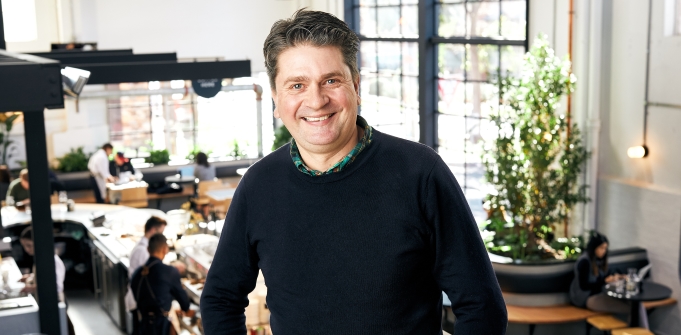
Nomad chief executive Craig Dickson. Source: supplied.
When the COVID-19 pandemic started, Nomad Coffee Group chief executive Craig Dickson was worried his company would face a collapse in revenue as cafes across Australia shut down or restricted their trading.
The business, which trades across the Veneziano, Black Bag Coffee Roasters and Coffee Hit brands, usually supplies between 400–500 cafes across Australia, but saw more than 50% of its customers shut their doors in March as coronavirus trading restrictions set in.
“We were forced to transition quite quickly,” Dickson tells SmartCompany.
But Dickson says the outbreak has been a lesson in the value of diversification after Nomad managed to make up for a collapse in its cafe wholesale revenue thanks to a 50% increase in sales of its Lazzio Coffee range in Aldi supermarkets.
In addition to Veneziano’s wholesale operation, Nomad’s Black Bag brand serves as a supermarket vertical, while Coffee Hit is its own franchised cafe operation, with 14 stores nationally.
“The thought of our local cafe being closed probably worried a lot of people, so they decided they’d make coffee at home,” Dickson says.
“We are a mad coffee-drinking nation, we have to have our caffeine hit every day, right?”
Nomad has supplied Aldi through its Black Bag Roasters brand since 2014, launching specialty coffee brands through the discount supermarket chain and even picking up a few industry awards in the process.
When the pandemic hit and customers were worried about popping down to their local barista, the products were in the perfect position to fly off shelves.
Dickson says sales began picking up at Aldi in mid-February, around the same time the first pangs of panic-buying started seeing supermarket shelves empty.
Things accelerated so fast it was difficult for the business to meet the orders, having had its global supply chains significantly disrupted by the outbreak.
“Aldi went bananas for about six weeks,” Dickson says.
“Trying to manage a customer of that size doing 50% more sales was challenging.
“There were people who used to be sales reps doing deliveries … others normally in customer service ended up in the packing line.”
Dickson says Nomad was forced to double down on its stock investment, ordering more green beans from central and South America than it typically would to ensure there was enough product to meet demand.
But the sales uplift has been a saving grace for the business, which not unlike many other firms across the economy, has only just emerged from crisis management mode.
“Our business is coming back now as we come out the other side … we’ve had a number of cafes re-open as JobKeeper has kicked in,” Dickson says.
“There’s a little bit of confidence we’re coming out the other side now.”
Nomad is one of about 800,000 businesses across Australia that have enrolled for the Morrison government’s $130 billion JobKeeper wage subsidy program, and Dickson says payments have started flowing.
While there’s talk the federal government could curtail the program to cut back on costs as trading restrictions ease, Dickson says Nomad originally planned to get through the pandemic with no government help.
The chief executive is hopeful Nomad will come out on the other side of the pandemic stronger, having secured newfound growth in its retail and e-commerce verticals.
“Businesses that have been able to transition into retail, online or have done something different, I think those are the ones that are going to come out the other side of this with a new market, and they’re going to get 80% to 90% of their old market back,” Dickson says.
“Some businesses will come out much stronger.”
Business has been picking up for Nomad in May as federal and state government officials begin easing trading restrictions across Australia.
Venues are beginning to open up with restrictions on patron numbers, but while some business owners are deciding to wade back into the market, Dickson says it’s still going to be hard for anyone in the industry to turn a profit.
“The industry is not going to recover fully until cafes are back to having full seating,” Dickson says.
“Having 10 people per cafe sitting down probably doesn’t assist us that much to be honest.
“It means you have to reactivate kitchens and all those sorts of things for not enough turnover, for restaurants, that’s not going to be viable.”
NOW READ: “A house of cards”: Why KeepCup is taking a harder line on single-use items


COMMENTS
SmartCompany is committed to hosting lively discussions. Help us keep the conversation useful, interesting and welcoming. We aim to publish comments quickly in the interest of promoting robust conversation, but we’re a small team and we deploy filters to protect against legal risk. Occasionally your comment may be held up while it is being reviewed, but we’re working as fast as we can to keep the conversation rolling.
The SmartCompany comment section is members-only content. Please subscribe to leave a comment.
The SmartCompany comment section is members-only content. Please login to leave a comment.